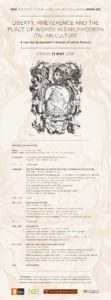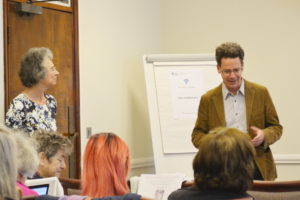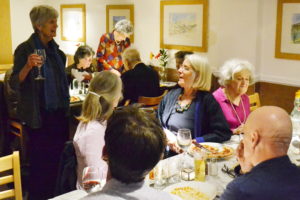Simone Testa reports:
 The event that took place at the Institute of Modern Languages Research, University of London, on 11 May 2018 celebrated a scholar whose research has always been marked by a strong multi-disciplinary character, Letizia Panizza. Participants from Europe, North America and Britain formed a very stimulating group of speakers and audience of three generations of scholars who were Letizia Panizza’s long-time friends and colleagues, and the first and second generation inspired by Panizza’s research interests.
The event that took place at the Institute of Modern Languages Research, University of London, on 11 May 2018 celebrated a scholar whose research has always been marked by a strong multi-disciplinary character, Letizia Panizza. Participants from Europe, North America and Britain formed a very stimulating group of speakers and audience of three generations of scholars who were Letizia Panizza’s long-time friends and colleagues, and the first and second generation inspired by Panizza’s research interests.
The image on the conference poster represents the emblem of one of the Academies dear to Letizia Panizza, the Incogniti of Venice. It shows a mountain and a river, possibly the river Nile, with the motto ‘ex ignoto, notus’ (known from the unknown). As organisers, we thought that this emblem was applicable also to Letizia Panizza’s scholarly mission, not only because of her interest in the group of writers known as the Incogniti. The emblem also describes Letizia’s approaches to research, her deep knowledge of and commitment to understanding the true meaning of texts, and the scholarly background that has characterised her contributions.
 Jane Everson, a long-time colleague of Letizia Panizza, and Stefano Jossa, a senior lecturer at Royal Holloway, opened the day. Everson recounted when Panizza organised two very successful events almost single-handedly, one on Renaissance Women, and another on Libertines. Jossa paid tribute to Panizza’s generosity in also sharing her knowledge through convivial moments, very much in the footsteps of the classical tradition of which she is a renowned scholar.
Jane Everson, a long-time colleague of Letizia Panizza, and Stefano Jossa, a senior lecturer at Royal Holloway, opened the day. Everson recounted when Panizza organised two very successful events almost single-handedly, one on Renaissance Women, and another on Libertines. Jossa paid tribute to Panizza’s generosity in also sharing her knowledge through convivial moments, very much in the footsteps of the classical tradition of which she is a renowned scholar.
Letizia Panizza herself set the friendly and scholarly tone of the Symposium when she addressed Stephen Clucas, her former PhD student, just before he started his tribute, by saying: “Remember, Stephen, I know that an encomium is meant to be full of lies!” In his remarks, Clucas underlined the breadth and depth of Panizza’s contributions to scholarship: her early interests in Lorenzo Valla and humanism; the lives of Renaissance philosophers; and her groundbreaking commitment to give a voice to Early-Modern women. Within this very broad frame, Panizza has explored all sorts of discourses and literary genra: satire, poetry, political treatises, polemical arguments and philosophical debates.
The Space of Women in Early Modern Italy could take the shape of the intimacy of domestic piety (Abigail Brundin) or the literary efforts of a mother who wrote behavioural instructions to her daughter. As for spaces strictu sensu, Sandra Cavallo illustrated how the rooms of a palace, designed to host the family of Cardinal Spada in Rome, included spaces for women, which were surprisingly more subject to intrusion by males than male rooms, despite the narrative of the protection of women’s honour in those centuries.
The panel on poetry offered a variety of topics, spanning from Alison Brown’s new research on thus-far neglected poems by Piero de’ Medici the Unfortunate. Brown commented on the network of people surrounding Piero, including Poliziano, who was among the first readers of Piero’s poetry. Amelia Papworth explained the contradictory attitude of the poetess Laura Terracina towards a giant of Italian literature such as Ariosto. Still on Ariosto’s circulation, Ambra Anelotti illustrated the literary adaptation of the poet’s characters in the epistolary genre, in the decades between the end of the sixteenth century and middle of the seventeenth.
The roles of individuals were the focus of Unn Irene Aasdalene’s paper, which illustrated the way in which the part of the female protagonist Diotima, in Plato’s Symposium, was then used and refashioned in Ficino’s dialogue De amore. John Sellars argued that the fashion of writing philosophers’ lives in Renaissance culture matched the widespread fascination with conceiving philosophy as a way of life. Michael Allen closed the panel with reflections on Platonic ideas.
In the last panel, Marta Fattori illustrated a case study of censorship of Machiavelli in eighteenth-century Rome, where a Master of the Sacred Palace aptly defined the Florentine Secretary as an author of ambiguous faith, whose work either enthused readers or made them utterly condemn his theories. Dilwyn Knox referred to Panizza’s interest in Giordano Bruno and his Spaccio de la bestia trionfante, proposing that Bruno’s recurring maxim ‘Nature is God in Things’ was actually an expression of the coherence of his philosophy. Finally, there was a return to Panizza’s interest in the voices of Early Modern Italian women. Francesca Medioli discussed her own detailed historical research into Tarabotti’s life during the years between her taking the veil, and her connection with the prince of the Incogniti academy GiovanFrancesco Loredan.
Finally, Stephen Clucas thanked several people and institutions for their help at various stages in the organisation of the successful event emphasising the importance of Panizza’s contributions, and which attracted a large audience and saw lively debates at the end of each panel. Many thanks to the generous sponsorship of four institutions: the Society of Italian Studies; the Society for Renaissance Studies; The University of Cambridge; and Royal Holloway University of London.
Organisers: Simone Testa, Stephen Clucas, Stefano Jossa, Abigail Brundin, Susan Haskins and Chiara Bechis.
Simone Testa, International Studies Institute, Florence


